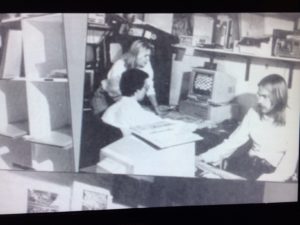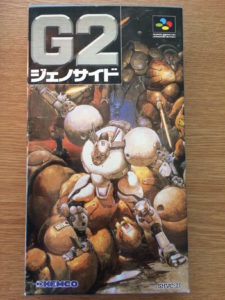A few weeks ago now, on the 28th May, I interviewed Anthony (Tony) Smith about his career in computer games. Over the years I have been interested in those people that worked in the British game industry who are not as well known, or did not remain in it after the 1980s/1990s. I had met Tony through mutual friends and while watching the “From Bedrooms to Billions” documentary, I saw a familiar face on screen (see image below). After taking a screenshot and sending it to Tony, he confirmed that the photograph was in fact of him during his time at Virgin Interactive, along with Andy Green and a lady called Lisa (whose surname he couldn’t remember, so if anyone else does, it would be interesting to know!) . Subsequent digging found that the photograph had also been discussed on a Facebook page, dedicated to Ocean, with different people listed in the image, which might be why it also ended up in the documentary.

(screenshot taken from “From Bedrooms to Billions“)
What was interesting about Tony’s journey into a career in the games industry during the 1980s and 1990s, was that it is not based around the often discussed ‘bedroom coder’. Although, as Tony reveals in the interview, he did make his own computer games at home, his first job was actually in scientific research. It was here that he learnt to use an Apple II computer, and then eventually bought a Commodore 64 when he was made redundant. This was the machine that he starting playing and programming games on. It was these games that got him the job at Virgin Games, as he showed them at the interview. During his time at Virgin Games, Tony worked on numerous games including a German version of Scrabble, Risk, and Diplomacy.
After being made redundant from Virgin, Tony got a job at Bits Studios where he working on Super Nintendo/Super Famicom titles including Genocide 2 (box art image below). Yet, the games industry took its toll with long hours, and this was one of the reasons Tony ended up leaving. He now continues to work as a programmer, but for a company supplying services to the transport industry. He is still using the programming knowledge he acquired from using the Apple II and Commodore 64 amongst other machines, albeit in a different industry today.

The full transcript for the oral history will be available on this site later in the year.
